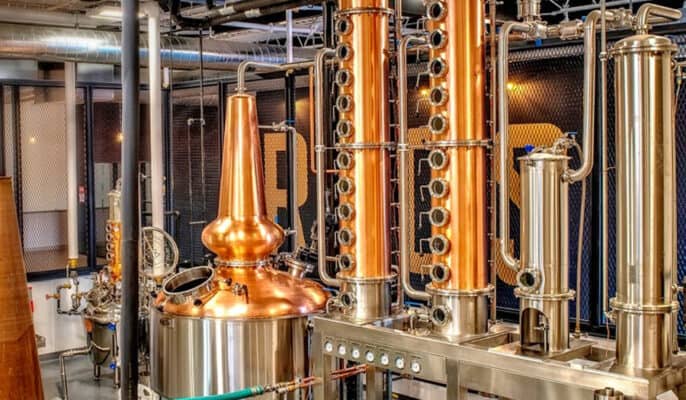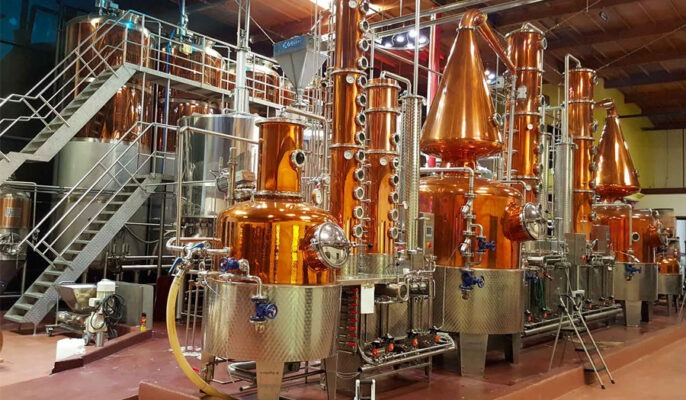Scaling 증류 is hard. Manual control causes inconsistent cuts, energy waste, and compliance risks. Agitate: one slip in the 증류 과정 can ruin a batch. Solution: an automatic distillation system that keeps temperature, reflux, and flow steady—batch after batch.
An automatic alcohol distillation system uses sensors, PLC control, and actuated valves to regulate heat and reflux so the 증류 run stays repeatable. Compared with traditional still operation, it improves yield, saves energy, and protects quality. From 냄비 스틸 에 칼럼 스틸, modern 증류 장비 adds automation for safer, cleaner, and more profitable production.
Outline
- What is an automatic 알코올 증류 system?
- Pot still vs column still vs automatic distillation unit: which is the right alcohol distillation equipment?
- How does an automatic 증류 시스템 work (boiler, vapor, condenser, control)?
- When to use steam distillation for botanicals?
- Batch distillation for whisky, brandy, 럼, and neutral spirits—what changes with automation?
- Sizing 증류 장비 (heating power, cooling water, water pump, capacity).
- Safety features, TTB and local regulations for a 상업용 양조장.
- Controls: 반자동 에 fully automatic automatic distiller 옵션을 선택합니다.
- Materials and build: made of stainless steel, distiller copper, corrosion, durability and performance.
- Lab & QA: determination of alcoholic strength—Kjeldahl distillation unit vs beverage 증류.
- Integrating with brewery & 와이너리 operations; kombucha, distilled water및 water distillation.
- Case study: small-batch upgrade—distillation results and ROI.
1. What is an automatic alcohol distillation system?
An automatic alcohol distillation system is a smart 증류 setup that senses temperature, pressure, and distillate flow, then adjusts burners or elements, reflux, and coolant to hit your targets. It keeps the 증류 steady so you can focus on recipe and quality instead of chasing dials.
In practice, automation adds a PLC/HMI, thermocouples, actuated valves, and setpoints. Whether the core is a 냄비 스틸 또는 칼럼 스틸, the system makes decisions in milliseconds. The goal is simple: repeatable 증류 runs, fewer off-notes, and better yield.
“Consistency is profit.” That’s what our experienced distillers repeat whenever we audit production lines. Automation helps deliver it.
턴키 살펴보기 alcohol distillation equipment and matched utilities.

2. Pot still vs column still vs automatic distillation unit — which is the right alcohol distillation equipment?
선택 right alcohol distillation equipment starts with the spirit. A 냄비 스틸 favors rich congeners for 위스키 또는 브랜디. 칼럼 스틸 push higher proof for neutral spirits. An automatic distillation unit overlays either with feedback control, keeping the 증류 on spec even as wash quality or ambient temperatures change.
Comparison table
| 유형 | 최상의 대상 | Typical Proof | Automation Fit | 참고 사항 |
|---|---|---|---|---|
| 포트 스틸 | Whisky, brandy, gin base | 60–80% | Basic to advanced | 클래식 traditional distillation character |
| 열 스틸 | Vodka, neutral | 90–96% | Medium to advanced | Higher rectification; precise reflux |
| Hybrid auto unit | Broad 증류 mix | 유연성 | 고급의 | Programmable profiles & repeatability |
If you’re evaluating options, browse 상업용 증류소 장비 to see vessel geometry, heating options, and control tiers.
3. How does an automatic distillation system work (boiler, vapor, condenser, control)?
A run starts in the 보일러, where gentle heat drives vapor up the column or head. Sensors track temperature and reflux ratio. A PLC uses algorithms to regulate heat input and coolant so the heads, hearts, and tails windows stay clean. The condenser turns vapor to liquid via controlled condensation and coolant flow—just enough to cool efficiently without shocking flavor.
Automation keeps the 증류 stable even when feed ABV or back-pressure changes. Alarms and interlocks add safety features that protect operators and product. This 자동화 is what separates modern 증류 장비 from basic rigs—and it’s why repeatable 증류 is now accessible to first-time teams.
For deeper system context, see our distillery equipment overview with typical P&IDs and skid layouts.
4. When to use steam distillation for botanicals?
증기 증류 is ideal when extracting delicate volatile compounds—think gin botanicals, citrus peels, or herbs. Instead of direct heating, steam passes through the basket, lifting oils at lower temperatures, then condensing them. This avoids thermal damage while keeping the 증류 clean.
Automatic control ensures stable steam flow and cooling, so your 증류액 stays bright. It’s also a friendly step for teams moving from 홈 증류 toward professional production: the control layer makes a complex 증류 gentle and predictable.
5. Batch distillation for whisky, brandy, rum, and neutral spirits—what changes with automation?
In batch distillation, automation profiles the curve: heating power, reflux, and cut points. For 위스키 또는 브랜디, you might run lower reflux to preserve congeners. For 럼, you might adjust mid-run to sharpen hearts. For neutral spirits, a profile aims at maximal rectification and clarity.
Quick view: yield & time (illustrative)
Yield (L/hr)
Manual: ████████ (8)
Automated ███████████ (11)
Real results vary, but our floor tests often show 10–25% efficiency gains with automated 증류—less babysitting, tighter 증류 cuts, happier tasting panels.
If you’re planning multi-style output, consider a hybrid distillation unit with programmable profiles. Review our alcohol distiller options to see what fits your distillation needs.

6. Sizing distillation equipment (heating power, cooling water, water pump, capacity)
Sizing 증류 장비 is about balance:
- 난방 전력 must get you to boil quickly but maintain fine control.
- 냉각수 flow and a reliable water pump keep condensers efficient.
- Column diameter sets vapor speed; too fast and separation drops, too slow and throughput suffers.
Small to mid plants often start at 300–1000 L wash charges; larger commercial lines run multicolumn trains. Plan for headspace, CIP, and future expansion. Our fermentation tank range pairs well to keep upstream gravity and off-gassing consistent for smoother 증류 나중에.
7. Safety features, TTB and local regulations for a commercial distillery设置特色图片
A 상업용 양조장 must meet fire code, electrical, venting, ATEX/IECEx where relevant, and the U.S. ttb framework or your jurisdiction’s equivalent. Document interlocks, pressure relief, flameproofing, earthing, and spill containment. Good 증류 design builds safety in, then proves it during commissioning.
Checklist highlights
- Certified flameproof panels; E-stops at eye level.
- Relief valves on kettle and columns.
- Redundant probes with drift alarms.
- Lockout/tagout built into HMIs.
Compliance isn’t an afterthought; it’s core to your 증류 plan and permits.
8. Controls: semi-automatic to fully automatic automatic distiller options
You can start 반자동—automated heating with manual cut confirmation—then scale to fully automatic with recipes, analyzer integration, and historian logs. An automatic distiller may include remote alerts, batch IDs, and CIP cycles so operators handle more value-add tasks.
Control tiers
- Basic: temp PID and coolant valve.
- Standard: reflux + flow control, recipe profiles.
- Advanced: inline ABV analyzer, cloud reporting, batch genealogy.
Automation doesn’t remove craft; it preserves it by repeating your best 증류 day after day.
9. Materials and build: made of stainless steel, distiller copper, corrosion, durability and performance
Spirit character and maintenance both depend on materials. Kettles and columns are often made of stainless steel for cleanability and 부식 resistance, with selective distiller copper contact to bind sulfur compounds. Frames and fittings should be food-grade, welds polished, and gaskets alcohol-compatible.
This mix of materials gives durability and performance without sacrificing flavor. The point isn’t shiny metal; it’s sanitary surfaces that endure, support tight seals, and keep 증류 hygienic.

10. Lab & QA: determination of alcoholic strength—Kjeldahl distillation unit vs beverage distillation
QA labs confirm ABV and impurities. For alcohol, a bench 증류 then volumetric read or inline meters works. For protein (brewing or fermentation byproducts), the Kjeldahl distillation unit (e.g., udk 149 automatic kjeldahl, udk 159 automatic kjeldahl, udk 169) handles kjeldahl nitrogen testing; brands like raypa also offer compatible systems. With an autokjel autosampler, runs become hands-off.
A lab flask, calibrated thermometer, and proper glassware matter. While these tools aren’t for beverage 증류 itself, they support quality by validating worts, washes, and spirits. That’s how your equipment ensures efficiency and precision from brewhouse to spirit proofing.
11. Integrating with brewery & winery operations; kombucha, distilled water, and water distillation
Most clients integrate stills with a 양조장 또는 와이너리. You can repurpose hot water loops, glycol, and CIP skids to unify utilities. Need neutral base alcohol for bitters or RTDs? Pair 증류 with filtration and proofing.
Beyond spirits, water distillation helps generate distilled water for lab use, rinsing, or proofing. We also support fermentation vessels for alternative beverages; see high-quality 콤부차 양조 장비 to align tank geometry and cooling with your 증류 plans.
12. Case study: small-batch distillation upgrade for a startup rum distillery
A startup producing 럼 moved from manual to recipe-driven 증류. After a 4-week ramp:
- Energy per liter dropped ~18%.
- Cut window variance fell from ±1.2°C to ±0.2°C.
- Rework lots fell from 6% to 1.5%.
The new line captured more hearts with cleaner 증류액, reduced staffing per shift, and boosted output by ~15%. That’s the quiet power of controlled 증류.
Bonus: Common system features and why they matter
Standard features
- CIP sprayballs; sanitary valves
- Insulated columns; sight glasses
- Recipe storage with audit trails
- Enclosures rated for washdown
Nice-to-haves
- Load cells for kettle charge
- Inline ABV and turbidity
- 원격 모니터링
Each adds visibility and repeatability to your 증류 days.
Buying guide: choosing a supplier and solution that fits
Start by listing your SKUs and proof targets, then match to a 증류 시스템 capable of those profiles. Ask for drawings, parts lists, utility loads, and spares. A good 공급업체 offers a product range from pilot to production and shares research and development notes for scale-up.
As a manufacturing plant, we build systems made of stainless steel with a focus on uptime and clean-in-place—so your team can spend more time crafting and less time troubleshooting.
자주 묻는 질문
Is automatic alcohol distillation allowed everywhere?
Always check local regulations. In many regions, permits cover spirit production, storage, and tax records. Commercial sites must meet building, fire, and ttb (U.S.) frameworks. Automation helps document runs, which simplifies inspections and compliance.
Does automation change flavor?
Automation doesn’t remove character; it repeats your best 증류. You still choose charge strength, cut points, and reflux. The controller just hits targets reliably so your 증류액 stays consistent.
Can I start manual and upgrade later?
Yes. Many clients begin 반자동 and add modules—reflux control, inline ABV, recipe logic—until they reach fully automatic. Design the 증류 skid with future ports and spare I/O.
What spirits benefit most?
Anything—neutral spirits, 위스키, 브랜디, or gin. Automation helps every 증류 by stabilizing temperatures and flows. For botanicals, steam distillation control is a plus.
What about proofing and alcohol content measurement?
Use inline meters and lab confirmation. ABV checks plus sensory notes assure quality. Accurate alcohol content is both a label requirement and a safety guard.
Can the same line make distilled water?
Some plants add a compact water distiller for utility water distillation. It supports lab work, proofing, and rinsing—kept separate from spirit 증류 paths for hygiene.
Glossary quick hits
- Automatic distillation: controls help run and repeat a 증류 recipe.
- Distillation unit: the skid: kettle, column, condenser, controls.
- Alcohol distiller: the apparatus or the person—context tells you which.
- Automatic alcohol system: a short way to say a smart 증류 line.
- 보일러: vessel that heats the wash.
Example spec snapshot (illustrative)
- Charge: 500 L, 10% ABV wash
- Heat: 45 kW electric
- Cooling: 2 m³/h at 18–22°C
- Cuts: Recipe control; heads/heart/tails logged
- Materials: sanitary 스테인리스 스틸 with targeted distiller copper contact
- Cleaning: Automated CIP
Safety & quality notes
- Interlocks prevent dry firing.
- Pressure relief and rupture disks protect vessels.
- Sensors are redundant; the HMI flags drift.
- Logs create traceability from fermenter to bottle.
“Build safety in, then prove it.” That’s our commissioning motto.
Final tips before you buy
- Pilot with your recipes; don’t pick a system on brochure specs alone.
- Ask for utility loads, spares, and training.
- Plan for future columns or baskets even if you don’t need them on day one.
- Confirm cleaning clearances and access—CIP saves hours every week.
- Keep records; 자동화 plus SOPs protects your brand.
Bullet-point summary
- Automatic distillation stabilizes your 증류 runs for better yield and consistent flavor.
- 선택 냄비 스틸, 칼럼 스틸, or hybrid distillation unit based on target spirits.
- 크기 증류 장비 around heat, coolant, and throughput.
- Build safety and compliance in from day one.
- Use lab tools (and, when needed, Kjeldahl testing) to support production quality.
- Pick a 공급업체 with a scalable product range and support for upgrades.




